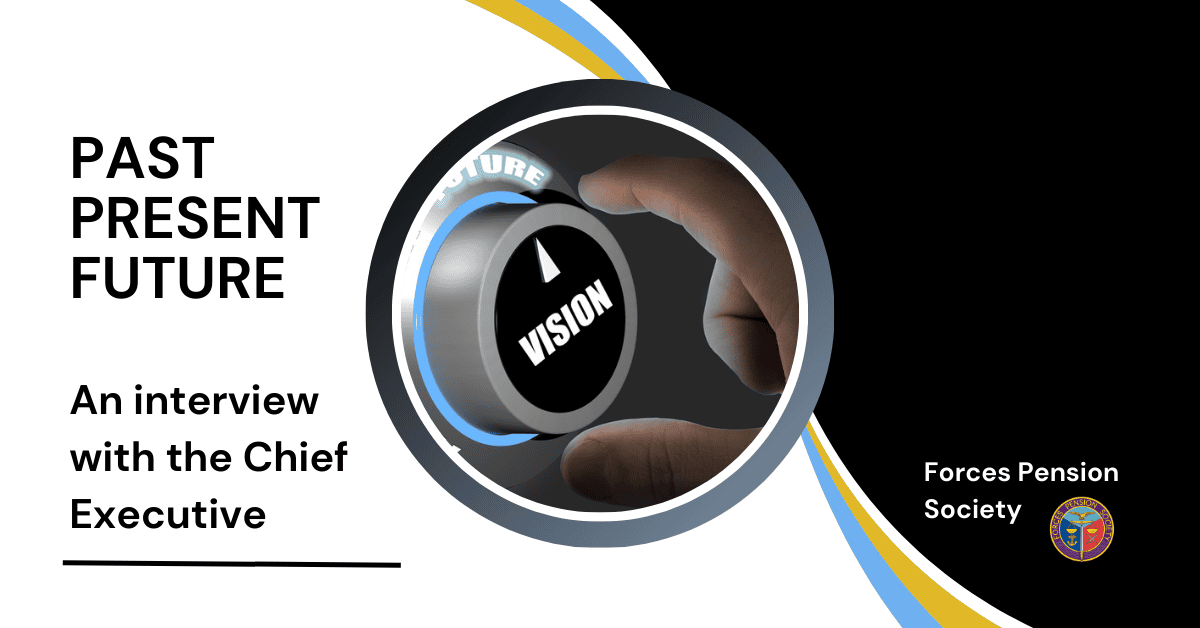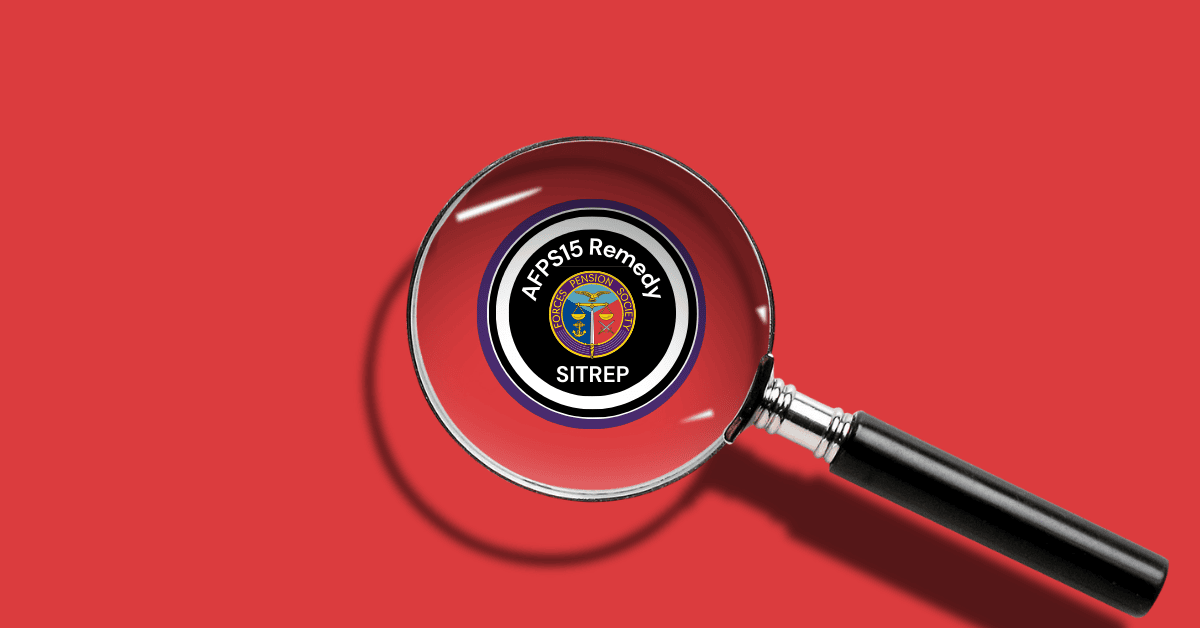
FPS Chief Executive Neil Marshall has been in post for just over five years. In a recent interview he talks about his view of the Society and the world we operate in, his vision and how he sees the work of the Society evolving.
The Society in 2024
How would you sum up your first five years?
An absolute blast – hugely rewarding and purposeful work, building upon the sound decision-making and long- term thinking of those who have led and served the Society since 1946.
In terms of context, the major themes have been: operating in a fluid political and policy backdrop; dealing with the sheer scale of the AFPS 15 remedy (McCloud); tackling the government’s flawed logic on pension taxation; navigating our way through Covid-19; modernising our business practices and embracing technology; and dealing with the consequences of a high inflationary environment brought about by the pandemic and Russia’s invasion of Ukraine.
How do you assess the health and effectiveness of the Society today?
Fighting fit and fully effective! Without being in any way complacent, I believe we’re in a good place both as an ‘enterprise’ – with 27% growth in membership since 2019 and sound finances – and as a ‘movement’ – the ability to influence policy and act in the best interests of our members.
We can’t fight on multiple fronts and have to choose carefully where to apply our limited resources. But with good outcomes achieved in areas such as the AFPS 15 remedy and pension taxation, plus our efforts to highlight the number of unclaimed Armed Forces pension benefits and how Veterans can claim them, I believe we are pretty effective. But, as ever, there’s always room for improvement.
How do you measure the impact of what the Society does?
Both evidentially – when policies are adopted or changed because of our engagement plus formal performance metrics and feedback, including our 2023 Membership Survey – and ‘atmospherically’.
What I mean by that is, in addition to monitoring commentary on social media when we’re conducting our everyday business – including employment fairs, Roadshow presentations or my meetings with senior military and government leaders and so on – we receive a lot of positive, and occasionally not so positive, commentary about what we do, how we do it and the impact our work has. Our distinctly personalized pension guidance service is frequently highlighted as a hugely valued aspect of our work.
Vision and Strategy
At the beginning of your tenure you noted a degree of uncertainty surrounding the long-term future of public sector pension schemes, set in the context of governmental spending priorities post-Brexit. How do you see things in July 2024?
My sense is the government and senior officials have a better understanding and appreciation of the purpose of the Armed Forces Pension Scheme now than was perhaps the case five years ago. Back then, too many I talked to saw the pension through a cost/overhead lens rather than seeing its direct link to sustaining operationally effective Armed Forces and supporting retention.
One of my highest priorities on arrival was to develop our ‘reason why’ narrative, which led to adopting our ‘pillars of the Armed Forces Pension Scheme’. This has become our touchstone and I have used it to brief the Armed Forces Pay Review Body, the Haythornthwaite Review into Armed Forces Incentivisation, the Minister for Defence People and Families, Defence’s senior leadership – basically anyone willing to listen to me and perhaps some who aren’t!
I believe it should stand the test of time and future scrutiny, but that is not to say public sector pension schemes are beyond further review. Fortunately, there is a strong evidential base that the 2015 schemes were declared by the government as ‘fit for the next 25 years’, which by my calculation is out to at least 2040. Well, that is our starting point for any future dialogue with government on the subject. The next few years are going to be very important it this regard, so we are primed.
You also identified the needs and expectations of our varied membership as requiring particular focus. What are your thoughts?
I was acutely aware I was taking the helm of a growing organisation, with increasing demand for our services, funded predominately by membership subscriptions. So, meeting our members’ expectations was paramount – and giving all our members good reason to remain with us for the long term was and remains vital to our sustainability.
During 2022, we implemented a membership engagement strategy, complete with personas, mapping out the ideal member journey – where you join the Society, reap the benefits of an excellent service, remain actively engaged by advocating our role as a force for good, value (indeed eagerly anticipate) our communications, especially Pennant, and take advantage of our excellent and wide-ranging member offers. With the Society’s membership spanning an age range of 22 to 102, we need to ensure there’s something for everyone.
Our 2023 Membership Survey reinforced our unique selling point (USP): the provision of a distinctly personalised pension guidance service. And you told us to keep telling you what we’re doing on your behalf and what’s on the horizon. Hence this interview!
How do you envisage the FPS evolving over the next five years?
I see our raison d’être remaining constant: to enhance Armed Forces pension clarity for our members and influence policy, now and for future generations. But the way we achieve this will evolve.
The Board have given clear direction that we are to retain our USP described earlier while continuously exploiting technology to keep improving our efficiency and processes, underpinned by a membership fee structure that represents value for money.
We will remain guided by our values of being ‘trusted, influential, passionate and collaborative’ in everything we do. These words will be matched by our deeds. We have made great strides in the digital space, and this will continue over the next five years: but we are and will continue to be a digitally enabled as opposed to digitally driven enterprise.
How sustainable is the current way of operating? Do you see a need for change?
I have many people to thank, including our voluntary Board of Non-Executive Directors, for guiding, supporting and challenging the senior leadership team as we designed and implemented our strategic plan and Sustainable Business Model, which was founded on the business best practices already in place and embraced others.
We are an SME (small to medium enterprise) with an annual operating budget of about £2m. And while some years have returned an operating deficit and others a surplus, taking the past five years as one epoch, we have returned an overall operating surplus of only about £30,000, reinforcing our status as a not-for- profit organisation.
Our financial reserves have kept pace with inflation, thereby sustaining their value and providing the financial means to meet our most likely contingent scenarios. Looking forward, we will keep our membership fee structure under review to ensure it remains fit for purpose and sustains the business for the long term.
Campaigning
Is campaigning still a big part of the Society’s work? Is ‘campaigning’ still an appropriate descriptor?
Campaigning remains firmly part of our DNA, but it is important to understand that we are not a union; the resources to initiate a major media and/or legal campaign on our own are limited.
The approach we have taken over the past five years (and how I see things continuing) is to hold the Ministry of Defence and wider government to account and influence policy by: maintaining our independent seat at the top table (on the MOD’s Pensions Board and other linked consultative and working groups); collaborating where interests align with other organisations such as the British Medical Association (pension tax being a good example); maintaining a strong network of influencers and advocates, including our Vice-Presidents in the House of Lords; and retaining access to senior officials and Ministers.
Much of this is ‘upstream’ work and not necessarily shouted from the rooftops, but it has proved effective to date. So perhaps ‘influencing’ is a better descriptor – but that isn’t to say we wouldn’t enter a full- blooded ‘campaign’ if we felt the circumstances justified it.
How do you assess which issues need attention?
Essentially by maintaining a ‘horizon scanning’ capability. And when a potential issue/topic that could warrant attention is identified, we take time to understand the true nature of the challenge before we act – look before you leap, if you like.It is important to stress that UK government policy avoids retrospective provision or legislation in order to control historic costs; public sector pensions are a matter of law, so proposals to change previous scheme rules are normally unlikely to succeed. So, we must be convinced that applying our limited resources, including human capacity, to such an effort is (a) the right thing to do, (b) has a good chance of success and (c) will materially benefit the affected population, including future AFPS members yet to join the Armed Forces.
Let me use the most obvious and current issue as a case in point. The challenge to the 2015 public sector pension schemes (McCloud case) met these three criteria and is a great example where the costly legal challenge was already under way. We quickly secured an undertaking from the MOD that any outcome in favour of the complainants (judges and firefighters) would be equally applicable to members of the Armed Forces Pension Scheme. With the numbers of Armed Forces people affected estimated at around 140,000, it was always going to be a long haul. And, you will all know, after a series waypoints and consultation exercises, the remedy has now entered a long implementation phase. Another example of identifying the right thing to do, our unclaimed pensions campaign, fitted the bill perfectly. Indeed, the evidence is in the MOD’s own AFPS Annual Report and Accounts.
We are not accusing the MOD of breaking any rule or not applying any effort to unite eligible Veterans with their preserved pension entitlements, rather that they should be straining every sinew to do this and working to ‘futureproof’ the system. And we can help publicise and galvanise the community of interest to spread the word – it is all about communications and signposting; calling out the issue and then working collaboratively where necessary for the greater good.
Challenging Government
How about relationships with the Ministry of Defence and other government departments? Is the Society valued and respected and do you need to pick your battles?
Some may disagree with my approach, but I see the Society as a critical friend rather than an adversary of the MOD. I believe this approach maintains our independence and inclines the MOD to engage with us when considering any policy changes that could affect the AFPS with second/third order consequences some may not have fully thought through.
I believe our involvement in the 2023 Haythornthwaite Review into Armed Forces Incentivisation Challenge Group helped to influence that review’s thinking. While we weren’t surprised with the report’s AFPS-related recommendations, the interdependencies between the key pillars of the AFPS and potential ‘law of unintended consequence’ type outcomes we highlighted were accepted. The next steps are for the MOD, and we will remain actively engaged.
While the MOD is the principal government department we deal with, we also engage directly with the Office for Veterans’ Affairs and with HM Treasury, normally when working with other organisations towards a common goal. For example, an ad hoc public service pension tax working group was formed in 2019 and helped present a united message directly into the centre of government. It took some time, but eventually positive change was achieved across the public sector. So yes, there is a mutual respect and a certain protocol. Both parties know their respective starting positions on most issues, so when we choose to have a ‘battle’, as you put it, it is because we are very sure of our ground…
Any thoughts on your approach now there’s a new government in office?
Consistency in our approach and policy position is important here; while we will of course maintain an open mind, the fundamentals (ie the centrality of people, the pillars of the AFPS and link to operational capability) remain true. As everyone will be aware, the Government announced a Strategic Defence Review on 16 July.
We will work constructively with the Government on matters relating to the AFPS and will always represent the interests of our members and the wider Armed Forces community when doing so. Looking more broadly across the entire Public Sector, the 2015 Public Service Pension Schemes are barely 10 years into their ‘fit for 25 years’ span, so if there is to be another review of the AFPS, or elements of the AFPS linked to the Haythornthwaite Review, we know our starting point.
The Changing World
What effect do you anticipate emerging technologies such as AI having on the way the Society conducts its business?
The guiding principle of being digitally enabled rather than digitally driven also applies to emerging technologies including AI. Automation will allow us to improve those systems and processes that lend themselves to such, freeing up time (the most precious resource) for the team to service the ever increasing demand for our pension guidance services and to continuously improve the overall service we provide to our members as envisaged in our membership engagement strategy. I do not see the bots taking over any time soon – but there’s a lot that such technologies can provide to improve business efficiency.
And what about the way we communicate?
Effective communications are central to our success, our relevance, how we influence policy and how we attract and retain our members. Critically, our communications must be joined up, so we established a Communications Working Group several years ago to keep looking ahead, ensure we are reaching our key target audiences, developing relevant themes and narratives and synchronising our communication products through a plethora of mediums: direct marketing and editorials into Defence-facing print and digital publications (Navy News, Soldier Magazine, RAF News and so on) and sharing topical articles of interest and updates via our website and across social media.
The Society now has more than 54,000 followers across Facebook, Twitter/X and LinkedIn, representing an almost 500% increase compared with our 2019 start state of 11,000 followers. But for me it is the quality of our communications rather than sheer numbers of followers that matters most – which is why our flagship publication Pennant and our member newsletters sit at the very heart of our communications effort.

Personal Insights
What have been the biggest challenges the Society has faced, and how were they overcome?
Two stand out: the McCloud case, which led to the AFPS 15 remedy, and the Covid-19 pandemic. Both came as shocks to the system in their own way and were overcome through applying some well founded principles of (dare I say it) military planning and decision-making: understanding the situation using all information available; working out what needs to be decided and by when; actively engaging with the key stakeholders; exercising control through established and understood mechanisms (our senior leadership team and weekly/monthly battle rhythm), keeping the team informed and acting upon their observations/ concerns (for example, rapidly building a work-from-home-capable business), empowering and trusting those with specific responsibilities and holding them to account. And of course, communicate, communicate, communicate, internally and externally.
As you go round the different Service establishments, what is your impression of the current generation of personnel and what they want out of their pension scheme, and how it is managed?
One of the most rewarding aspects of this role is remaining connected with the serving military community – I have always said that if I wasn’t the CEO, my next preference would be Roadshow Manager!
I am in no doubt that today’s serving military are far more financially inquisitive than I ever was. And while this is good, it presents its own challenges when complex information needs to be made readily accessible and digestible across multiple domains. Many understandably demand immediate answers/explanations, can be quite sceptical about the ‘system’s’ motives (nothing new there, to be fair) and some need careful and considered guidance through significant life decisions.
What they want out of their pension scheme is pretty consistent and could be summed up in one word: ‘certainty’ – a well administered, appropriate and fair financial platform from which to launch their second career and lay the foundations for a dignified retirement. Nothing wrong with that.
What has given you the greatest satisfaction during your time as Chief Executive?
So many highlights, it is difficult to single one out. But in general terms, it is the satisfaction derived from working with a committed, professional and values-driven team and achieving outcomes that really matter at the individual and strategic level. What’s not to like.





